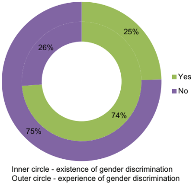Is there a gender disparity in the residency training programme? Perspectives of trainees from a tertiary hospital in Nigeria
Main Article Content
Abstract
INTRODUCTION: Universal health coverage in Africa is constantly threatened by inadequate workforce relative to the health needs of the population. These inadequacies may be worsened by gender disparities with female doctors worse affected. This study aims to highlight the gender distribution of residents across specialties, compare the residency programme experiences of male and female trainees and assess their perspectives towards gender disparities in training.
METHODOLOGY: This was a pretested cross‑sectional online survey using Google Forms© involving all 208 University of Uyo Teaching Hospital (UUTH) residents with additional information from the hospital database. Data was analyzed using Stata version 16 with statistical significance P < 0.05. Ethical approval was obtained for the study.
RESULTS: Of 208 trainees, 128 (61.5%) were male while 80 (38.5%) were female. Departments had from 2 (ENT) to 29 residents (internal medicine). A response rate of 58.6% was obtained from 122 respondents (62.3% males). General surgery had a 100% male predominance while paediatrics had a 68% female predominance. Most respondents (72.9%) felt that the programme was quite stressful and 36.9% had considered leaving. Half of the trainees (50.8%) got maximum support from their families in the form of emotional and psychological care. While 73.8% acknowledged gender disparities, only 24.6% experienced discrimination.
CONCLUSION: The UUTH residency training programme is male dominated, especially in general surgery with training challenges experienced by male and female trainees. Gender disparities exist though only a quarter experienced discrimination. Existing disparities should be urgently addressed and gender mainstreaming promoted by training institutions.
Downloads
Article Details

This work is licensed under a Creative Commons Attribution-NonCommercial-ShareAlike 4.0 International License.
References
WHO | Global Strategy on Human Resources for Health: Workforce 2030. WHO. Available from: http://www.who.int/hrh/resources/globstrathrh‑2030/en/. [Last accessed on 2020 Jul 30].
Akwaowo CD, Motilewa OO, Ekanem AM. Assessment of resources for primary health care: Implications for the revitalization of Primary Health Care in Akwa Ibom, Nigeria. Niger Med J 2020;61:90‑5.
Bruce AN, Battista A, Plankey MW, Johnson LB, Marshall MB. Perceptions of gender‑based discrimination during surgical training and practice. Med Educ Online 2015;20:25923.
Gender Inequality. European Institute for Gender Equality. Available from: https://eige.europa.eu/thesaurus/terms/1182. [Last accessed on 2020 Jul 28].
Shannon G, Jansen M, Williams K, Cáceres C, Motta A, Odhiambo A, et al. Gender equality in science, medicine, and global health: where are we at and why does it matter?. The Lancet. 2019;393:560-9.
Khisa AM, Ngure P, Gitau E, Musasiah J, Kilonzo E, Otukpa E, et al. Gender responsive multidisciplinary doctoral training program: The Consortium for Advanced Research Training in Africa (CARTA) experience. Glob Health Action 2019;12:1670002.
Lukela JR, Ramakrishnan A, Hadeed N, Del Valle J. When perception is reality: Resident perception of faculty gender parity in a university‑based internal medicine residency program. Perspect Med Educ 2019;8:346‑52.
Chukwumah NM, Umweni AA. Gender disparity and the dental profession in Nigeria: A 10‑year follow‑up study. Niger J Dent Res 2017;2:87‑92.
Esan O, Adeoye A, Onakoya P, Opeodu O, Owonikoko K, Olulana D, et al. Features of residency training and psychological distress among residents in a Nigerian teaching hospital. South African Journal of Psychiatry. 2014;20:46-50.
Eysenbach G. Improving the quality of web surveys: The Checklist for Reporting Results of Internet E‑Surveys (CHERRIES). J Med Internet Res 2004;6:e34.
Yusufu LM, Ahmed A, Odigie VI, Delia IZ, Mohammed AA. Residency training program: Perceptions of residents. Ann Afr Med 2010;9:91‑4.
Ebuenyi ID, Ikuabe PO, Ufondu CC, Onubogu CU, Onyeka IN. Gender variations in specialties among medical doctors working in public healthcare institutions in Bayelsa State, Nigeria. Nigerian Journal of Medicine. 2017;26:18-22.
Ojo OS, Egunjobi AO, Fatusin AJ, Fatusin BO, Adeyemo AJ. A systematic review of the literature on the specialty preferences of Nigerian medical graduates: Disparity between the literature and reality. S Afr Fam Pract 2019;61:209-14.
Makama JG, Garba ES, Ameh EA. Under representation of women in surgery in Nigeria: By choice or by design? Oman Med J 2012;27:66‑9.
Eze BI, Nwadinigwe CU, Achor J, Aguwa EN, Mbah A, Ozoemena F. Trainee resident participation in health research in a resource-constrained setting in south-eastern Nigeria: perspectives, issues and challenges. A cross-sectional survey of three residency training centres. BMC medical education. 2012;12:1-9.
Ogunnubi. Stress and Training Satisfaction Among Resident Doctors in Nigeria: Any Justification for a Change in Training Policy? Available from: http://www.jcsjournal.org/article.asp?issn=2468‑6859;year=2018;volume=15;issue=1;spage=32;epage=40;aulast=Ogunnubi. [Last accessed on 2020 Jul 27].
Ogunsemi OO, Alebiosu OC, Shorunmu OT. A survey of perceived stress, intimidation, harassment and well‑being of resident doctors in a Nigerian Teaching Hospital. Niger J Clin Pract 2010;13:183‑6.
Miller J, Katz D. Gender differences in perception of workplace experience among anesthesiology residents. J Educ Perioper Med 2018;20:E618.
Barnes KL, McGuire L, Dunivan G, Sussman AL, McKee R. Gender bias experiences of female surgical trainees. J Surg Educ 2019;76:e1‑14.
Phillips NA, Tannan SC, Kalliainen LK. Understanding and overcoming implicit gender bias in plastic surgery. Plast Reconstr Surg 2016;138:1111‑6.


